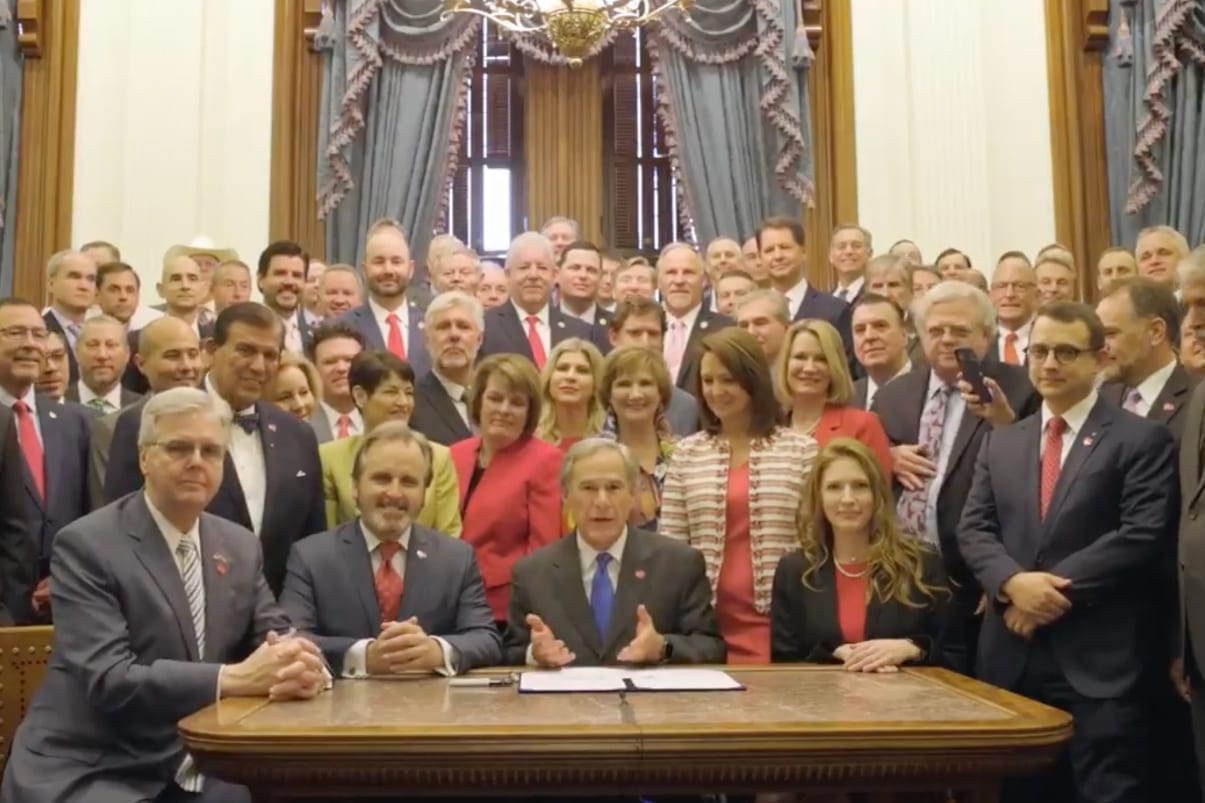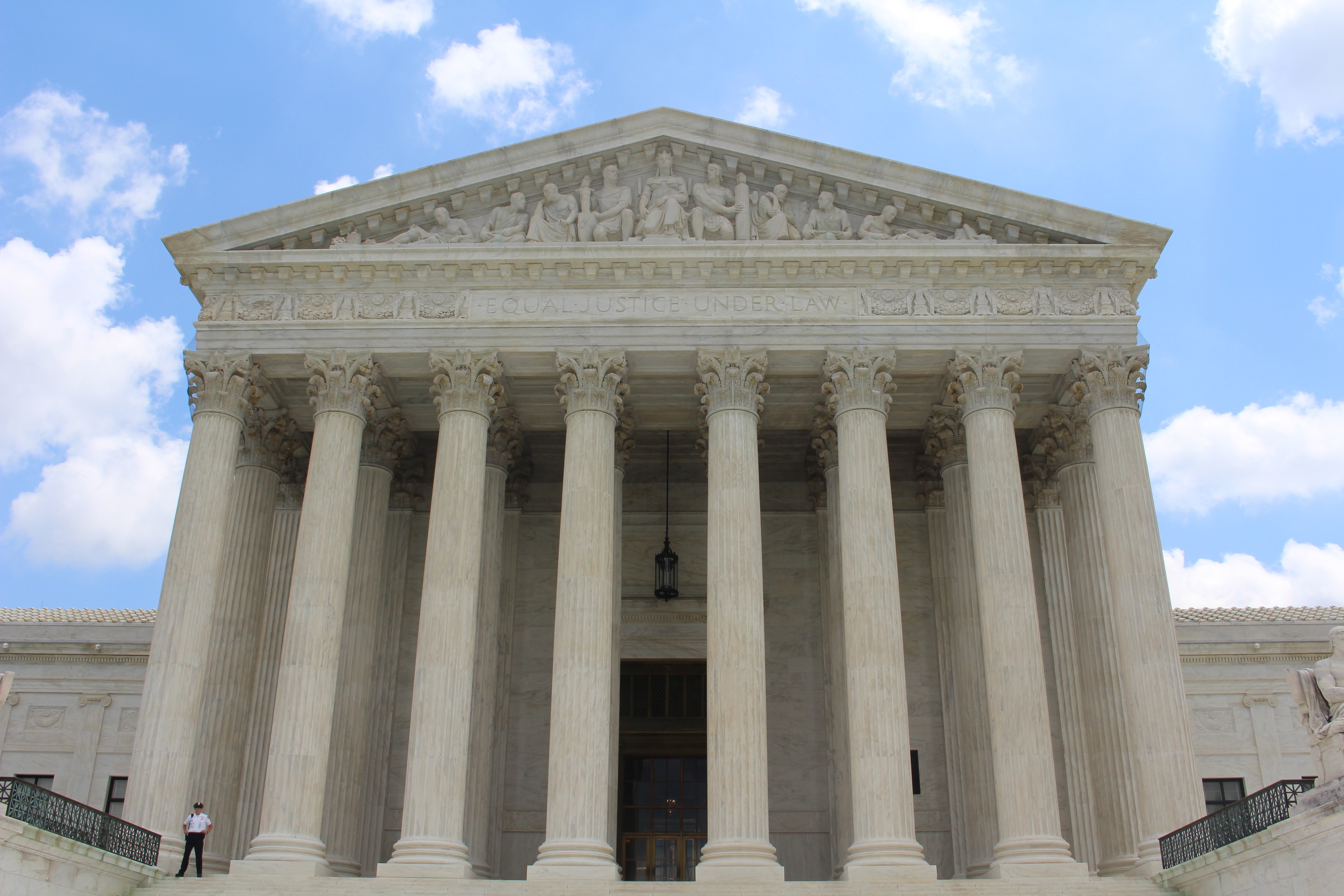
Texas Gov. Greg Abbott, center, gave a brief speech before signing the Texas Heartbeat Act into law May 19.
Texas has become the latest and largest state to prohibit abortions when a fetal heartbeat can be detected.
Gov. Greg Abbott signed the Texas Heartbeat Act into law May 19 and thereby enacted a ban on abortions as early as six weeks into pregnancy, which is when a fetal heart potentially can be detected. Texas joins at least 10 other states with fetal heartbeat bans, but it is easily the most populous state to approve such legislation. The 2020 census showed Texas with a population of more than 29 million people, making it second to California.
The bill signing by Abbott, a Republican, came only two days after the U.S. Supreme Court announced it would rule on the constitutionality of a less restrictive law – Mississippi’s ban on abortions of unborn children whose gestational age is more than 15 weeks. It is the latest of many state measures approved in recent years that establish prohibitions on abortion at certain stages of pregnancy and offer challenges to the 1973 Roe v. Wade decision that legalized the procedure nationwide.
Southern Baptist leaders commended the Texas law.
Elizabeth Graham of the Ethics & Religious Liberty Commission (ERLC) expressed her gratitude “that leaders in Texas are moving their state toward justice for the vulnerable by protecting preborn children from abortion when the child’s heartbeat is detected.”
The momentum across state legislatures “to enact this common-sense measure is encouraging,” said Graham, the ERLC’s vice president of operations and life initiatives, in written comments. “We are grateful for the Baptist leaders and committed pro-life advocates in the Lone Star State that worked to pass this law. Our prayer is that God would continue to bless this work and hasten the day when preborn children are protected in law and cherished in our culture.”
Tony Wolfe, associate executive director of the Southern Baptists of Texas Convention (SBTC), said Abbott’s signing of the heartbeat bill “is a victory the SBTC celebrates as a step in the right direction. We pray for continued measures in the Texas Legislature and gubernatorial office that would uphold the right to life of the preborn.”
“SBTC churches have been steadfast in their conviction that ‘Children, from the moment of conception, are a blessing and heritage from the Lord,’” Wolfe said in a written statement, quoting Article XVIII of the Baptist Faith and Message 2000, the Southern Baptist Convention’s statement of faith. “Every preborn baby is worth our tireless efforts to champion and preserve the dignity he or she carries as an image bearer of God.”
Texas Right to Life described enactment of the ban as a “a historic step” in the fight to protect life.
Before signing the bill, Abbott said, “Our Creator endowed us with the right to life, and yet millions of children lose their right to life every year because of abortion. In Texas, we work to save those lives, and that’s exactly what the Texas Legislature did this session.”
Meanwhile, Alex McGill Johnson, president of the Planned Parenthood Federation of America (PPFA), called the Texas law “cruel and extreme.” On Twitter, she said abortion access “has never been more at risk.”
According to Planned Parenthood’s latest annual report, its clinics performed nearly 355,000 abortions, making it the country’s largest abortion provider. PPFA and its affiliates collected $618.1 million in government grants and reimbursements at federal, state and local levels during the 2019-20 statistical year, based on the same report.
Even before Texas passed its heartbeat ban, states were on pace to set a record for the most pro-life laws enacted in a year, at the crest of a wave of such measures approved in the last decade-plus. Through the first four months of 2021, a total of 13 states placed into law 61 abortion restrictions, including eight bans on the procedure, according to a report issued April 30 by the Guttmacher Institute.
The confirmation during the Trump administration of three justices considered to be conservatives has given pro-life advocates hope the Supreme Court is ready to use a state law as the vehicle to overturn Roe, which legalized an expansive abortion regime throughout the country. If the high court were to reverse Roe, states would once again determine abortion policy.
In announcing they would rule on the Mississippi abortion ban, the justices said they would limit their decision to whether, as the state said in its appeal to the court, “all pre-viability prohibitions on elective abortions are unconstitutional.” Viability for an unborn child, or the ability to survive outside the womb, is typically considered to be several weeks after the limit set by Mississippi’s law. The justices are expected to issue an opinion on the Mississippi abortion ban in the Court’s next term, which concludes in the summer of 2022.
The Texas ban includes an exception for a medical emergency in a mother and authorizes a person to bring a civil lawsuit against someone who performs an abortion in violation of the law or assists in the performance of such a procedure. The law is scheduled to take effect Sept. 1.
Texas joins at least Georgia, Iowa, Kentucky, Louisiana, Mississippi, North Dakota, Ohio, South Carolina and Tennessee in enacting fetal heartbeat laws without starting times for the bans. Arkansas’ heartbeat ban requires an unborn child to be at least 12 weeks’ gestation to be protected, according to the National Right to Life Committee. So far, courts have blocked enforcement of the state heartbeat bans.
(EDITOR’S NOTE – Tom Strode is Washington bureau chief for Baptist Press.)


